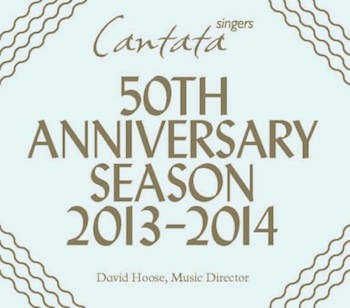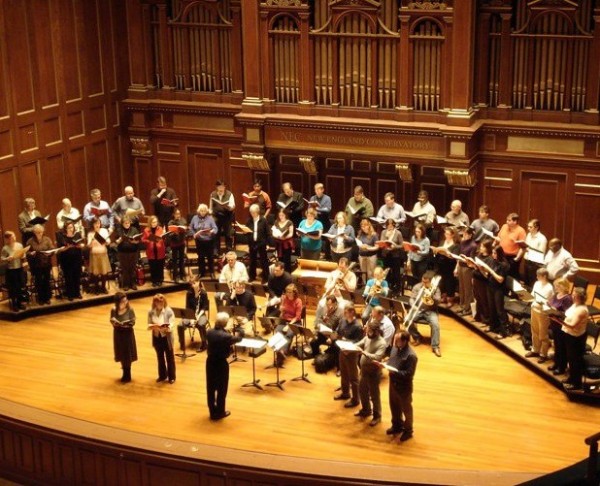Concert Review: The Cantata Singers Celebrates its Fiftieth Season — Bach to the Future
The jam-packed audience for the opening performance of the fiftieth season was filled with Cantata Singers old timers.
A Celebration of Bach Cantatas, The Cantata Singers at New England Conservatory’s Jordan Hall, Boston, MA, September 20.
By Susan Miron
Friday night was a celebration of the opening of Cantata Singers’ fiftieth season as well as a reflection on the organization’s impressive accomplishments. David Hoose, the Cantata Singers’ music director, opened the concert of three Bach cantatas with a brief memorial for four people associated with Cantata Singers who died recently. Many in the audience might have known them – the beloved harp and orchestra mover, Martin Jarman, violist Mary Ruth Ray, hornist Richard Menaul, and percussionist John Grimes. At the mention of Grimes’ smile, Hoose teared up. The conductor has cultivated a close relationship with Boston’s musical community while at the same time building a large and devoted core audience. His mention of names that were so familiar to so many people in Jordan Hall was a perfect introduction to Bach’s intimate music.
Rather than a discussion of the program, the pre-concert talk explored the interesting history of both the Cantata Singers and Bach, whose reputation, recordings, and historically informed performances have soared over the past half century. The jam-packed audience was filled with Cantata Singers old timers; it was almost as intimate an affair as Hoose’s moving opening to the concert. The speaker, besides Hoose, was David Rockefeller (Jr.), one of three people present who had sung with the Cantata Singers during its first season. Talk about long-term commitments! Hoose mentioned that in other choruses it is the social aspect of choral singing, the friendly atmosphere, that draws in singers for the long haul. But with the Cantata Singers, he stressed, it’s the serious commitment to music making, despite what people do in their varied day jobs (doctors, architects, etc).
Rockefeller recalls that, back in 1964, there was only one recording of Cantata 72. Bach was then on the cusp of being “rediscovered.” He praised the group’s “willingness to try almost anything.” (Among the group’s accomplishments are its thirteen commissions, including their 1990 premiere of Donald Sur’s “Slavery Documents.”) Still, Bach has been the backbone of the Cantata Singers repertoire, especially once the musicians realized that there was such a variety of riches among the 200 Bach cantatas. The approach from the beginning was to use a small chorus (not a gargantuan Handelian one) with the appropriate number of instruments (rather than just the organ). In the program notes, Charles Husbands, founding and current Cantata Singers member, writes that “the first singers sought adventure and illumination through an exploration of a revered but underperformed repertoire, in the process bringing it to life for others through vital performances. The goals of today’s Cantata Singers are much the same, although the field of discovery has expanded briefly. This season alone touches four hundred years of composition, while J.S. Bach’s creative life was only as long as that of Cantata Singers to date.”
Friday’s program in Jordan Hall featured the same three cantatas done in the same order as at its opening concert. The first, Cantata BWV 131, “Aus der Tiefe rufe ich, Herr, zu dir” was written for various church occasions.
Scored for strings with oboe and bassoon, Cantata BMV 131 features a tenor aria for Psalm 130:6 (“My soul waits for the Lord from one morning watch to the other”) and a beautiful cello obligato, here played elegantly by Raphael Popper-Keiser. The soloists were Eric Christopher Perry, tenor and Dana Whiteside, bass. One cannot adequately praise oboist Peggy Pearson, who has performed with Cantata Singers and Emmanuel Music for forty years. Bach is, by now, in her DNA, and each time (and there were many) she had a prominent part the result was astonishment. She was stupendous all evening, and in the second cantata, the famous “Ich habe genug,” BVW 82, she and baritone James Maddalena were perfection. Scored for one singer (no chorus), it is an emotional tour de force propelled by some of Bach’s most poignant melodies. Performing this composition with a singer of Maddalena’s stature must be an oboist’s dream. Pearson has done it many times, including with Hunt Lieberson. She plays it wonderfully.
Those who heard Lorraine Hunt Lieberson’s searing performance of this piece under director Peter Sellars will likely never forget it. She was dressed as a cancer patient – the illness from which she would die in 2006, not too many years later. When she sang “I’ve had enough… I wish to depart from here” it was electrifying. A great artist, Maddelena took a different approach, which was also deeply affecting. Bach worked on this piece on and off for twenty years, composing four variants of it, and it remains one of his most beloved works. It’s middle aria “Schummert ein, ihr matten Augen,” a sleep aria, was meltingly beautiful and deeply peaceful.
The third cantata, “Alles nur nach Gottes Willen,” BWV 72 (“Everything according to God’s will,” written for the Third Sunday after Epiphany) broke the magical spell of “Ich habe genug” with a rousing performance by the chorus and a slightly expanded instrumental ensemble (including oboist Jennifer Slowick). Several soloists contributed mightily to the success of this performance, especially the superb alto Lynn Torgove, who sang passionately at the end of her solo, “Lord as You will, I will not die, though body and life abandon me, if Your spirit speaks this word in my heart!” Bass James Dargan and soprano Lisa Lynch were also very fine, and the chorus was its usual excellent self.
Cantata Singers’ 50th Anniversary Season continues next with the gorgeous Vespers of 1610 by Monteverdi on Dec. 7, and Mendelssohn’s Elijah on February 22. A chamber concert, ‘Mostly Mendelssohn and Friends’ is scheduled for March 30 while Bach, Zelenka, and the world premiere of John Harbison’s Supper at Emmaus is set for May 9. Chances are very good that these concerts will be well worth hearing. Kudos to David Hoose.
Susan Miron, a harpist, has been a book reviewer for over 20 years for a large variety of literary publications and newspapers. Her fields of expertise were East and Central European, Irish, and Israeli literature. Susan covers classical music for The Arts Fuse and The Boston Musical Intelligencer. She is part of the Celtic harp and storytelling duo A Bard’s Feast with renowned storyteller Norah Dooley and plays the Celtic harp at the Cancer Center at Newton Wellesley Hospital.


